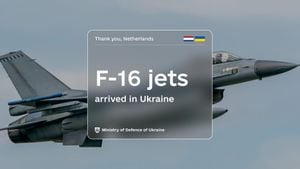Russian Foreign Minister Sergey Lavrov has declared Russia's readiness to engage in peace negotiations with both Ukraine and European nations. Yet, he emphasized, the cessation of active combat operations would only occur when the results of these discussions align with Russia's interests.
During remarks covered by TASS, Lavrov asserted the importance of receiving "ironclad" guarantees from NATO concerning Ukraine's non-membership. He pointed out, "The involvement of Ukraine in NATO is one of the key reasons for what is happening, there is no doubt about it." His statements underline Russia’s insistence on fundamental changes as preconditions for peace.
The Russian minister's statements arrive as geopolitical tensions continue to rise, particularly following recent meetings. On February 18, discussions were held in Riyadh, Saudi Arabia, involving American and Russian delegations. While reports indicate these talks were deemed to proceed well, both sides maintained their positions firmly.
Following the meeting, Lavrov remarked, "This meeting gave hope for normal dialogue with the U.S.," outlining his expectation for separate negotiations—one involving the U.S. directly and another bringing Ukraine to the table at future discussions. He noted, "We are ready to negotiate with Ukraine and Europe, with any representatives who, in the spirit of goodwill, would like to help achieve peace, but we will stop military actions only when these negotiations yield firm and sustainable results satisfactory to the Russian Federation."
These negotiations have sparked tensions, especially as Ukraine's leadership expressed concern about being excluded from what they view as decisions affecting their sovereignty. Ukrainian President Volodymyr Zelensky criticized the dynamics of U.S.-Russia talks occurring without Ukraine’s involvement, implying they mirror the ultimatums presented by Russia at the onset of the full-scale invasion.
Through various statements and appearances, both Lavrov and President Putin have suggested the necessity of considering the existing realities on the ground, reinforcing Russia's stance on fostering negotiations under its terms. The prospect of peace remains uncertain, hinged significantly on the acceptance of these conditions by Ukraine and its allies.
Compounding the complexity, the Kremlin does not foresee the participation of the European Union or China at this stage, indicating the bilateral nature of the current negotiations. While signaling openness, Lavrov's conditions highlight the continuing challenges faced by Ukraine and the international community as they navigate the murky waters of diplomatic engagement against the backdrop of military conflict.
Analysts suggest Russia's stringent conditions might prolong not only the conflict but also thwart potential resolutions, leading to graver humanitarian impacts on the ground. With both sides entrenched, the path to peace appears fraught with obstacles, pressing for international dialogue and intervention.
To date, the discourse between Russia and Ukraine has been stubbornly polarized, marked by mistrust and diverging narratives about commitments and trustworthiness. While Lavrov exudes optimism for dialogue, skepticism persists among observers about whether these negotiations can ever materialize effectively without mutual concessions and genuine diplomatic goodwill.
The situation remains fluid, with continuing updates expected as the diplomatic saga evolves. For now, the international community is left watching closely, waiting to see if peace negotiations will lead to any tangible results, or if they will merely serve as another chapter of posturing and delay amid the conflict.



